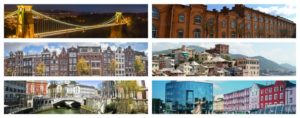

Environment
New Innovative Approach to Tackle Air Pollution Announced
Thousands of people are dying prematurely from the toxic air they are forced to breathe every day. But now, as part of a new innovative project featuring the University of the West of England (UWE Bristol), people across Europe will be asked to share their opinions on how to reduce air pollution and improve public health in six cities across the continent by using a virtual game.
In an innovative approach to addressing air quality, residents will use a specially-created game on their smartphones, tablets and laptops to suggest how their home cities should develop in future.
Responses gathered from players will form a ‘people’s vision’ spelling out to civic leaders exactly how the cities should be shaped over the next 35 years – and what measures need to be taken to improve air quality, reduce CO2e emissions and diminish negative health effects.
Named CLAiR-City, the four-year project features 16 partners including the pilot cities of Bristol, Amsterdam, Aveiro in Portugal, Ljubljana in SIovenia, Sosnowiec in Poland, and the Liguria region in Italy.
UWE Bristol’s Dr Enda Hayes, Technical Director of CLAiR-City, said a bold approach was being taken because all other efforts were struggling to combat air pollution, a problem responsible for the deaths of more than 400,000 people in Europe every year.
Up to a third of Europeans living in cities are exposed to pollutant levels exceeding EU air quality standards, with approximately 90 per cent affected according to the World Health Organization’s more stringent guidelines.
Dr Hayes, Associate Professor and Director of the Air Quality Management Resource Centre (AQMRC) at UWE Bristol, said: “Air quality management is failing in many cities around the world. This is an exciting and innovative project to try to address one of the key issues – how do you empower citizens to define their own solution?
“Using game technology as an engagement platform means everyone’s voice and opinion is valued. If you run traditional workshops or surveys it can be that the quiet voices get lost and the reach can be limited. With our game, everyone’s voice is equal and we can all be experts on our own city.”
Funded by the European Commission Horizon 2020 programme, the project is aimed at creating a major shift in public understanding towards the causes of poor air quality – encouraging a focus on people’s everyday practices like commuting and shopping rather than technology such as cars, buses and HGVs.
Dr Hayes added: “To date, air quality policy has primarily been focussed on technology and technological solutions. Instead of apportioning the pollution to the technology (e.g. cars), this project will apportion it to people and our behaviour (e.g. why do we use our cars).
“By apportioning pollution to behaviour and practises, we want to give people a better understanding of how their behaviour generates pollution. If they change their behaviour it can have a substantial impact on a city. The innovation lies in how we are bringing social science into our data analysis and then engaging city citizens with that data to help them visualise and define their city’s future.”
The game, being developed by UWE’s in-house gaming studio PlayWest, will give the player the chance to outline how they would like to live, behave and interact in their city up to 2050. Responses from players will lead to the creation of a ‘citizen-led future city scenario’ which will be delivered to city leaders as a ‘policy package’ document setting out what changes they would eventually like to see introduced.
Dr Hayes said: “We wanted to empower citizens to define their futures and use that to influence policy. We are using game technology to engage a wider population and to envision what a city looks like in 2050 so the project is particularly relevant to younger people.
“Also involved in the project is UWE Bristol’s Science Communication Unit, whose internationally-recognised expertise in public engagement and dissemination will help enhance the reach of the study.”
The project will also involve detailed data and policy analysis, with a study of existing evidence on themes such as energy and transport at a local, national and European level. It will explore six cities in detail but will also generate data which could be utilised by all EU cities with a population of more than 50,000.
The 16 partners include universities, cities, small and medium sized enterprises and research organisations.
Ten members of staff from UWE Bristol – which has received over £980,000 (€1.25m) of the total funding – will be involved including members of the Air Quality Resource Management Resource Centre, Science Communication Unit and PlayWest.
Jeroen van der Laan, of economic policy consultancy Trinomics and the project coordinator, said: “We are very excited to start implementing our CLAiR-City project over the next four years with the excellent group of Europe’s leading research organisations and frontrunner cities we have in our consortium. CLAiR-City will develop innovative approaches and means of communication to inform European citizens about the air quality in their cities and engage them in forming ideas and pathways on how their living environment should look like in 2050.”
Professor Jim Longhurst, Assistant Vice Chancellor for Environment & Sustainability at UWE, said: “CLAiR-City is a great example of how different expertise can be blended together across the university, and indeed Europe, to build imaginative and effective responses to the profound environmental and public health challenges we face.”


 Environment12 months ago
Environment12 months agoAre Polymer Banknotes: an Eco-Friendly Trend or a Groundswell?

 Features11 months ago
Features11 months agoEco-Friendly Cryptocurrencies: Sustainable Investment Choices

 Features12 months ago
Features12 months agoEco-Friendly Crypto Traders Must Find the Right Exchange

 Energy11 months ago
Energy11 months agoThe Growing Role of Solar Panels in Ireland’s Energy Future




























